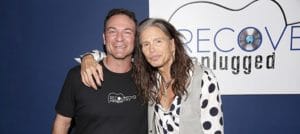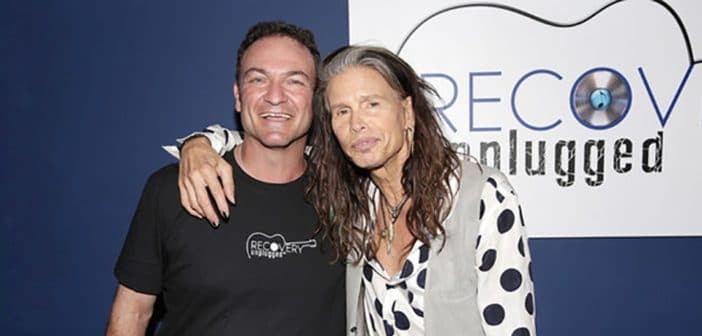 Paul Pellinger had been working as a therapist, interventionist and consultant for more than 20 years, helping clients seeking long-term recovery. He found that traditional methods weren’t the most effective ways to treat addiction.
Paul Pellinger had been working as a therapist, interventionist and consultant for more than 20 years, helping clients seeking long-term recovery. He found that traditional methods weren’t the most effective ways to treat addiction.
“On most days if I was in a good space and we had rapport we were able to engage the client,” he says. “But there was a significant percentage of the time that it didn’t work.”
Pellinger started to wonder if there was a way to remove the human variable—to help people connect with their emotions directly, kickstarting the therapeutic process. Suddenly it occurred to him: music.
“The only form of communication that consistently communicates to the soul is music,” he says. “There’s a reason most religions use it.”
Pellinger recalled all the times that he had used music to encourage himself and others to stay grounded in the moment.
“It occurred to me these were some of the things we’re trying to get our clients to do,” he said.
He realized that most rehab programs and recovery professionals use relapse triggers and focus on consequences in order to keep clients from using.
“Clinicians play a lot of defense and use fear as a deterrent, which doesn’t work,” he says. After all, one of the main signs of addiction is doing the same action again and again, despite the negative consequences.
People who were successful in long-term recovery, he saw, had experienced a change in their souls, emotions and hearts. Music could tap into that.
In addition there was a strong biological case to be made for using music in therapy. Studies show that listening to music releases dopamine in the brain in the same way that drugs do.
“If you give someone shot of heroin, whiskey or cocaine it lights up the brain. A chord change, a lyric or a song lights up the brain the same way,” Pellinger says. “We’re helping the client to achieve that same euphoria without using drugs.”
Pellinger knew that he could harness music to help people recover from addiction. In September 2013, Recovery Unplugged officially opened. Since then more than 1,000 clients have come through the program’s Fort Lauderdale location, and a second facility has opened in Austin, Texas with more facilities to come.
While people in opioid addiction treatment programs around the country drop out about half of the time, Pellinger says that over 90 percent of people who come into Recovery Unplugged finish their program.
“We’ve figured out a way to harness that music that leads to much-improved chances at long-term recovery,” he says. That’s because everyone loves music, and connecting through lyrics and melodies provides positive reinforcement that clients can use throughout their lives. Music can be used as a recovery trigger, versus traditional treatment that focuses on relapse triggers.
“Music can be used to make recovery more of a payoff than getting high,” Pellinger explains. “It’s giving them a jumpstart on how to continue to appreciate and deal with life by using music.”
That connection can help address issues like distorted perceptions, low self-esteem, negative behaviors and poor coping skills that can plague people who are misusing drugs and even those in early recovery.
In addition, music is a daily part of most people’s lives. Music is a catalyst to help clients practice the spiritual principles that are behind the 12 step approach: alumni from Recovery Unplugged are reminded about recovery every time they put on a song.
“We can use music to help clients retain the information that we’re trying to teach them.” Pellinger says. “In traditional treatment what is done in 30 days can be undone in 30 minutes because clients don’t retain it. Here, music is used as an anchor, just like the song that helps kids to learn the ABCs.”
When clients leave the program they are given an MP3 player with an individualized playlist that they have created throughout their stay at Recovery Unplugged.
That’s the culmination of a long process of connecting with clients’ musical tastes. When a new client is screened before coming to Recovery Unplugged, they’re asked about their favorite song. When they are picked up for rehab, that song is playing.
“Right away rapport is established and the clients feel heard,” Pellinger says. By using music to connect, clinicians are able to start working more intensively with clients just after their arrival versus dealing with the normal two week adjustment period to the new environment.
Each therapy session at Recovery Unplugged—whether individual or group—starts off with something related to music, oftentimes a lyric. Clients discuss what the lyric means to them, and use that as a catalyst to talk about their own experiences without defensiveness, Pellinger says.
“Clients often have difficulty expressing what they think or feel, but I guarantee you somebody had written a song about it,” he says. “The key is to match that particular lyric up with whatever skill set, perception or behavior we are attempting to teach the client.”
Pellinger emphasizes that music-based treatment works for everyone: in fact, 85 percent of clients at Recovery Unplugged are not musicians. The treatment center also works with all genres and musical tastes in order to help more people live a sober life that is fulfilled and fun.
“I’m grateful that we have music as a catalyst in order to help people,” Pellinger says. “We’re creating a movement that can help sick and suffering addicts and potentially break the cycle of addiction for decades to come.”
Recovery Unplugged is a music-based rehabilitation and recovery center in Fort Lauderdale, Florida and Austin, Texas. Get more information at www.recoveryunplugged.com or connect on Facebook, Instagram, Twitter and YouTube
Photo courtesy of Recovery Unplugged; used with permission.
Sponsored DISCLAIMER: This is a paid advertisement for California Behavioral Health, LLC, a CA licensed substance abuse treatment provider and not a service provided by The Fix. Calls to this number are answered by CBH, free and without obligation to the consumer. No one who answers the call receives a fee based upon the consumer’s choice to enter treatment. For additional info on other treatment providers and options visit www.samhsa.gov.




